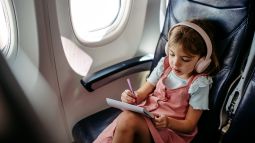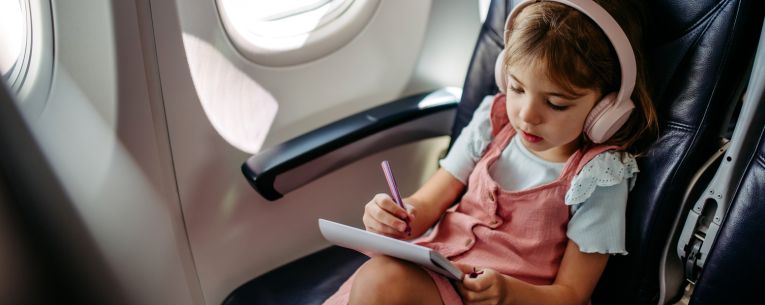Travel can be both exciting and stressful. It exposes you to thrilling experiences, such as zooming above a forest canopy or tasting new cuisine in a city far from home. But travel also means dealing with packed airports, bustling streets and blaring noises. For adults and children with sensory processing disorders, these new and intense sensory stimuli can be overwhelming. Neurodivergent people, such as those with autism and ADHD, are more likely to experience sensory processing disorder.
Here are some tips for people with a sensory processing disorder, that could be helpful for managing new sights, smells and other sensory stimuli while traveling.
How can I manage busy airports?
Airports are chaotic under the best of conditions. There are loudspeaker announcements, people chatting on cell phones, crying children and speedy moving walkways. Here are some ways to manage it all.
Plan ahead to reduce anxiety on the day you travel. One way to go about this is to purchase travel insurance, which can help protect the money you spend booking your trip by reimbursing certain non-refundable expenses if your trip is canceled or delayed for a covered reason.
Some travel insurance plans also offer emergency medical benefits, which is particularly important when traveling abroad. Your domestic health insurance coverage may not fully cover you during international trips. Get a quote to find out how Allianz Travel Insurance benefits can help you have peace of mind when you roam.
Do some prep the night before. You want to do your best to reduce stressors within your control, before going into a stressful environment. Print your ticket. Pack your carry-on so that your most important and often-used items and travel documents are easy to access.
Give yourself peace of mind by double-checking your transportation arrangements. You don’t want to be frustrated by waiting at your destination for your ride after a long day. You’ll want to have your friend or shuttle waiting for you. And you can avoid getting thrown off by temperature changes or hunger by bringing snacks, water and your favorite cozy hoodie or sweater.
Bring items that ground or calm you. It helps to give yourself pleasant or relaxing sensory experiences while exposed to jarring stimuli. Some items that can help with that are mints and gum, smells you enjoy in diffuser jewelry, a weighted laptop bag, hats or other clothing that feel good on your skin. Headphones and your favorite tunes. You can also reduce overwhelming noises with Loop Earplugs.
Move your body. It can be stifling and frustrating to sit still on a plane for hours. Take a standing break or walk the aisles. Yoga poses, such as the Tree or Mountain, can help calm restlessness and don’t take up much space on a cramped airplane.
I am a parent of a child with a sensory processing disorder; how can I help my child while traveling?
If you’re a parent of a child with a sensory processing disorder, the top tip is to be patient and don’t sweat the small stuff — if you’re calm, they’re calm.
Prepare and practice with your child. Both children and adults like to know what to expect before heading into a new or stressful situation. You can help children prepare by using social stories that model common travel situations. Videos and mock practices are helpful, too. The Fly for All app by Alaska Airlines is a great prep resource.
Remember, travel is fun! Get kids excited and looking forward to the trip by creating a countdown calendar a month out.
Book bulkhead seats when possible. These are the seats with extra legroom, located behind airplane walls. Your child can swing their legs and stand up to stretch.
Get the wiggles out by having your child do what occupational therapists refer to as heavy work. In the hours before your kid buckles up for the flight or car ride, have them expel energy with exercises such as sprints, bunny hops and more. Let them carry and handle their own luggage or the family luggage cart with some help.
Reduce noise disruptions with devices such as Loops Earplugs or headphones with their favorite tunes.
Keep your child’s physical needs in mind by dressing them in comfy, easy-to-remove layers. Bring a soothing item from home, such as their favorite hat. Make sure to keep plenty of snacks and water on deck.
Which travel companies offer sensory-friendly accommodations?
JetBlue has a solid reputation for serving individuals with special needs, according to an article by Chicago Occupational Therapy. The airline offers silent pre-boarding and other accommodations.
Autism on the Seas partners with cruise lines such as Royal Caribbean, Norwegian Cruise Line and Disney to help craft travel plans for people with autism. The program provides one staff member to every two family members with autism.
The International Board of Credentialing and Continuing Education Standards credentials zoos and aquariums with its Autism Certification for inclusive education and amenities for people with autism. Here’s a list of Autism Certified Zoos and Aquariums.
Nature is often calming for children and adults with sensory processing disorders. Here’s a list of recommended national parks for families of children with autism.
Get a quote today to find out how an Allianz Travel Insurance plan can help you on your next trip.
Related Articles









Share this Page